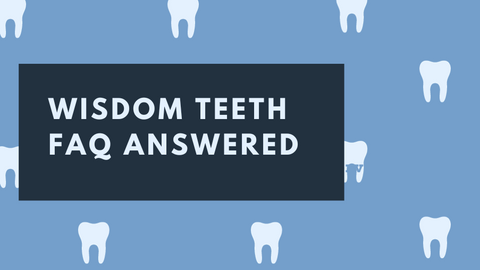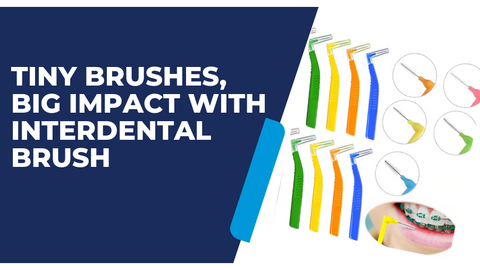Q1. What are wisdom teeth?
A. Wisdom teeth are the latecomers of your mouth, often arriving in your late teens or early twenties, causing some to dub them "late bloomers." These third molars were useful for our ancestors but now commonly serve as troublemakers, often requiring removal.
Q2. What are the first signs of wisdom teeth?
A. The first signs of wisdom teeth typically include occasional discomfort, jaw stiffness, and a feeling of pressure in the back of your mouth. It's like a gentle tap on your dental shoulder, warning you of their arrival.
Q3. Are wisdom teeth bad?
A. Wisdom teeth themselves aren't inherently "bad." They're a natural part of your dental anatomy. However, they can become problematic if they cause pain, crowding, or other oral health issues, which often lead to their removal.
Q4. Can wisdom teeth make you sick?
A. Wisdom teeth can potentially make you sick if they become infected or impacted, leading to conditions like pericoronitis. These infections can cause fever, swelling, and general discomfort, impacting your overall health.
Q5. How to clean wisdom teeth?
A. Cleaning wisdom teeth is like cleaning any other teeth. Use a soft-bristle toothbrush and fluoride toothpaste. Pay extra attention to the back of your mouth, where wisdom teeth are located, and floss regularly to keep the area clean. If your wisdom teeth are impacted or challenging to clean, consult your dentist for guidance.
Q6. Do wisdom teeth have roots?
A. Yes, wisdom teeth have roots, just like any other teeth in your mouth. These roots anchor them in your jawbone. The number of roots can vary, typically ranging from one to three.
Q7. Why are they called "wisdom teeth?
A. Wisdom teeth earned their name because they typically emerge when a person is older and presumably wiser, usually in late adolescence or early adulthood. However, their reputation for causing trouble suggests that wisdom doesn't always come with age!
Q8. When do wisdom teeth usually come in?
A. Wisdom teeth tend to make their grand entrance between the ages of 17 and 25, just when you thought you were done with all your "growing pains.
Q9. Why do wisdom teeth cause pain?
A. Wisdom teeth tend to make their grand entrance between the ages of 17 and 25, just when you thought you were done with all your "growing pains."Wisdom teeth can be pain creators because they often arrive without a proper invitation, leading to overcrowding, impaction, and misalignment in your mouth, which results in discomfort and pain.
Q10. Do all people need to have their wisdom teeth removed?
A. Not everyone needs wisdom teeth removal; it depends on factors like space in your mouth, pain, and potential oral health problems. It's a case-by-case decision.
Q11. What are the common signs of wisdom teeth problems?
A. Common signs of wisdom teeth problems include pain in the back of the mouth, swelling, difficulty opening your mouth, redness, and sometimes bad breath, like a dental alarm bell.
Q12. How can I relieve wisdom teeth pain?
A. Oraspot 15g
Q13. Can wisdom teeth impact my overall oral health?
A. Absolutely, untreated wisdom teeth issues can throw your entire oral health off balance. They can lead to misalignment of other teeth, gum disease, and even cavities, creating a domino effect in your mouth.
Q14. Can wisdom teeth impact my sinus health?
A. Wisdom teeth located in the upper jaw can sometimes push against the sinuses, potentially causing sinus issues. This is a less-known impact of wisdom teeth.
Q15. Is there a link between wisdom teeth and headaches?
A. Some individuals report experiencing headaches or migraines due to the pressure exerted by wisdom teeth.
Q16. Can wisdom teeth influence speech or pronunciation?
A. Wisdom teeth can sometimes affect the positioning of the tongue or other teeth, which in turn can alter speech or pronunciation.
Q17. How do wisdom teeth relate to dietary changes in early humans?
A. Wisdom teeth and dietary changes in early humans go hand in hand. These extra molars helped our ancestors grind tough, unprocessed foods like roots and leaves. However, with modern diets and cooking methods, they've become more of a nuisance, often requiring removal.
Food for Thought - A Healthy Diet for Healthier Gums! Click Here
Q18. Can wisdom teeth affect facial aesthetics and symmetry?
A. Wisdom teeth can indeed disrupt facial harmony. They may push other teeth around or cause jaw issues, which can affect facial aesthetics and symmetry, creating an unbalanced smile.
Q19. Do wisdom teeth have a role in sleep disorders?
A. Wisdom teeth and sleep disorders are somewhat connected. Impacted wisdom teeth may contribute to airway obstruction, potentially worsening conditions like sleep apnea, which can disrupt your sleep quality.
Q20. Can wisdom teeth removal impact the taste or oral sensitivity?
A. Wisdom teeth removal typically doesn't directly affect taste or oral sensitivity. However, temporary changes in sensation can occur due to swelling or anesthesia, but they usually return to normal once you heal.
Q21. Can wisdom teeth issues be linked to mental health conditions like anxiety or depression?
A. There's no direct link between wisdom teeth issues and mental health conditions like anxiety or depression. However, the pain, stress, and discomfort from these problems can certainly affect a person's overall well-being, potentially exacerbating existing mental health concerns.
Q22. Can wisdom teeth be removed before they erupt?
A. Yes, wisdom teeth can be removed before they fully erupt. This proactive approach is often taken to prevent potential issues such as impaction, overcrowding, or misalignment. It's common for dentists and oral surgeons to recommend early removal in certain cases.


